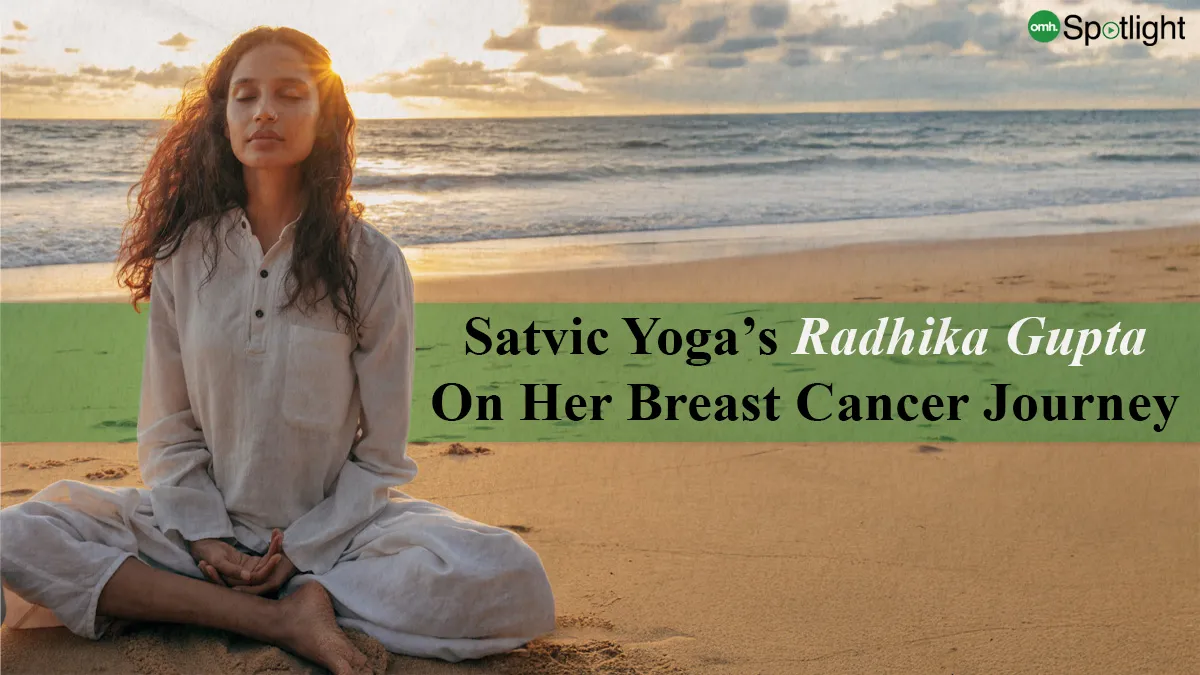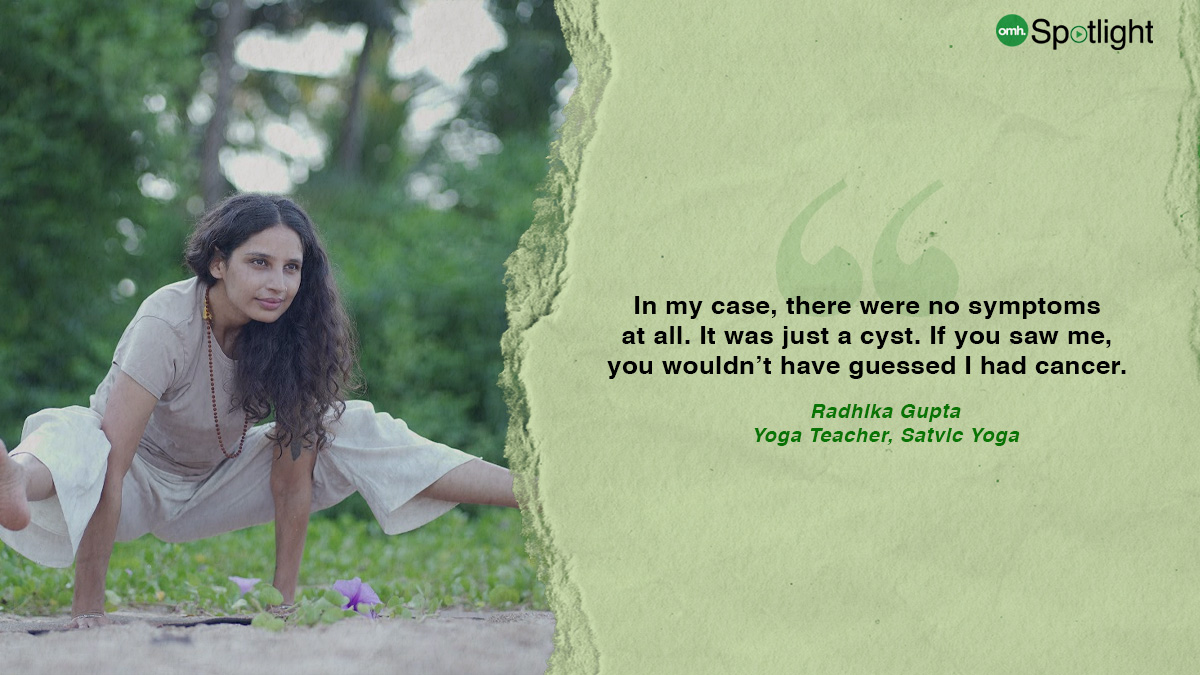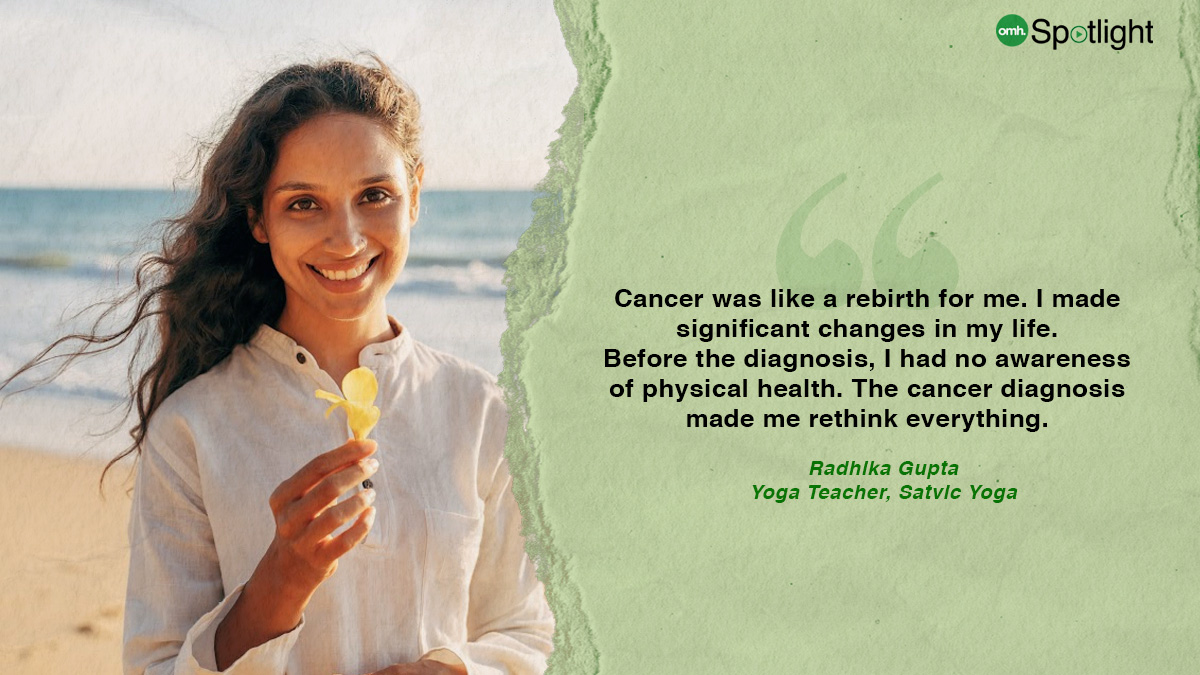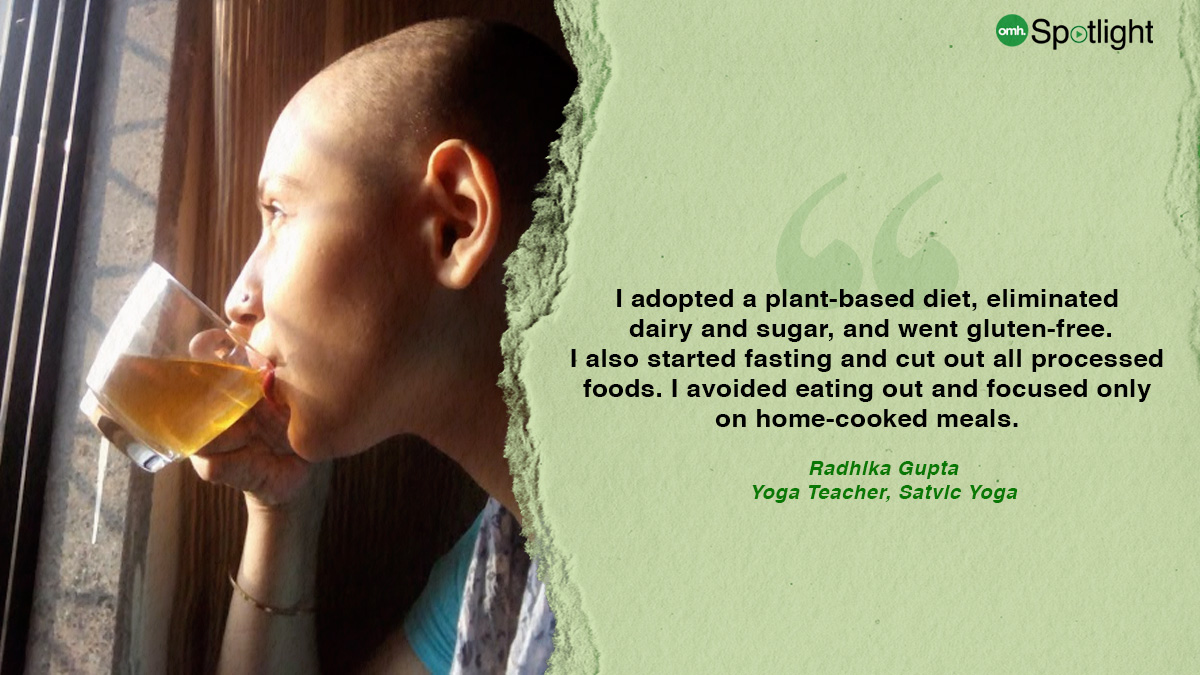
As a health reporter and writer, I’ve spoken with many cancer fighters and survivors. Most of their journeys begin in a similar way—some with noticeable symptoms, others with unexpected diagnoses during routine checkups. What follows, however, is always unique, with each story offering its own valuable lessons and insights.
Table of Content:-
In 2015, when Radhika Gupta, then a 28-year-old counsellor, discovered a large lump in her breast, little did she know that this moment and the cancer diagnosis that followed would ultimately change her life—for the better. While such an event is likely to break a person, Radhika chose to make something out of it.
In an exclusive OMHSpotlight interview, Satvic Yoga’s Radhika Gupta opens up about her journey and experience with cancer, discussing not just the struggles but also the healing that followed. For her, cancer changed her perspective on life, and she chooses to not see it in a negative light.
When It All Began…

At just 28 years old, Radhika discovered a lump in her breast. It wasn’t painful, nor did it come with any alarming symptoms. A routine checkup led to a biopsy, revealing it was a cyst, which was eventually drained, and life moved on. But something lingered. A PET scan that followed was inconclusive, after which she moved to Mumbai, where she sought a second opinion. Even if benign, her new doctor advised surgery due to the lump’s size. It seemed like a precautionary step—one that would put her worries to rest. But weeks later, the hospital called with news that turned her world upside down; she faced the unimaginable. The biopsy results revealed an aggressive and rare form of breast cancer.
"The urgency was overwhelming," she recalled. "It all happened so fast—I barely had time to process it."
Her then-husband, a naval officer, stood by her. Though their marriage eventually ended on amicable terms, he was her pillar of support during those difficult days. With no time to waste, she underwent a radical mastectomy and embarked on a gruelling two-year treatment journey.
Speaking with the OnlyMyHealth team, Dr Jagannath Dixit, Senior Consultant - Surgical Oncology, Aster CMI Hospital, Bengaluru, describes radical mastectomy as the age-old operation for breast cancer, preferably done for locally advanced cancers of the breast. However, with recent advancements in understanding and managing breast cancer, the approach has evolved, he says. "We now often use neoadjuvant chemotherapy first to shrink the tumour in the case of locally advanced breast cancer. This allows us to downstage the cancer and aim for breast-conserving surgery whenever possible," he shares.
However, when the tumour is fixed to the chest wall, there is significant skin ulceration, or the chest wall muscles are involved, mastectomy becomes necessary.
Unlike many young patients who struggle to have their concerns taken seriously, Radhika was fortunate. The doctors left no room for doubt; they were certain about the severity of her condition and insisted on aggressive treatment.
“I also sent my reports to my brother, who worked in the pharmaceutical industry in the U.S… He consulted with experts at Johns Hopkins. They confirmed that the treatment worldwide for this type of cancer was the same,” she said.
Unfortunately, fear is often a barrier when it comes to cancer. Many hesitate to seek medical advice, dreading the worst. But for her, there was no choice. "I resisted at first," she admitted, "but my spiritual foundation helped me accept it. I believed this was meant to cleanse me in some way."
It was just the beginning of something greater.
The Path To Self-Discovery And Body Awareness

With a background in psychology, Radhika was no stranger to conversations around mental health. But physical health? That was still an unexplored area.
“I understood emotions and the mind, but I had zero awareness of how to care for my body,” she admitted. The diagnosis became a turning point—a wake-up call to not just survive but to completely restructure and reevaluate how she lived, moved, and nourished herself.
And so, as she navigated surgeries, chemotherapy, and recovery, she began to pay attention to what her body needed. “This journey forced me to tune into myself. It wasn’t just about the treatment; it was about healing from the inside out.”
From Plant-Based Diet To Gluten-Free: How Diet Shaped The Journey

According to Dr Dixit, a healthy lifestyle is a very important concept for the patients who already have developed breast cancer or those who probably have high risk factors. "So, a healthy lifestyle can improve overall survival and quality of life in breast cancer patients. And among the healthy lifestyle changes, diet and exercise constitute a very important component."
A 2024 review published in the journal Nutrients also showed that healthy lifestyle choices, like a Mediterranean diet and regular exercise, may help lower the risk of breast cancer and improve outcomes after diagnosis. Other diets, such as fasting or plant-based eating, are also being explored for their potential to support treatment.
In the aftermath of her diagnosis, Radhika immersed herself in research. A scroll through her social media, and you’ll find informative reels and videos around how our lifestyle, including diet and physical activity, plays a role in influencing our cancer risk. What she found changed everything for her personally, and it could be a learning experience for all of us.
“I switched to a plant-based diet, gave up dairy and sugar, and went gluten-free. No processed food, no eating out—just simple, clean, home-cooked meals,” she shared.
Her choices were informed by a growing awareness that cancer cells thrive on glucose, found abundantly in grains and processed foods. She also began intermittent fasting and stuck to nutrient-dense meals that supported her immune system and detoxified her body. It is evident that these shifts weren’t just about physical recovery; they were an act of reclaiming control in a time that felt uncertain.
Yoga And Healing
View this post on Instagram
Radhika revealed that long before her cancer diagnosis, she had turned to spiritual texts like the Bhagavad Gita and teachings of Swami Vivekananda. But it wasn’t until after her treatment began that she embraced the physical practice of yoga.
Too weak to attend classes, she turned to YouTube, beginning with simple videos at home. “Even 10-15 minutes a day made a difference. I practised twice a day when I could; it calmed my anxiety, helped with nausea, and gave me strength,” she said.
The healing wasn’t just physical. Yoga helped her unravel years of emotional baggage. Through journaling, forgiveness exercises, and self-reflection, she learnt to release shame, guilt, and self-blame. “Before yoga, I was impulsive, anxious, and all over the place. Now, I feel calm, stable, and happy. It truly transformed me.”
“Cancer Was A Rebirth For Me; It Empowered Me”
Looking back, Radhika doesn’t see cancer as a curse. She calls it a “rebirth”.
“For me, cancer was empowering. Before, I was always looking for someone else to fix my life. After my diagnosis, I realised that only I could change my life and make myself happy. This awareness was the key to everything else falling into place,” she said.
To anyone facing cancer or any life-altering challenge, her message is clear: “Look within. Take charge. You might not control the diagnosis, but you can choose how you respond to it.”
Today, Radhika uses her voice and experience to empower others, offering guidance, yoga videos, and hope to those walking similar paths. “I wouldn't wish it on anyone, but I wouldn’t take it back either,” she said, “because it made me me.”
Also watch this video
Read Next
Air Fryer vs Deep Fryer: Which Is Healthier? Expert Reveals Cancer Risks & Cooking Benefits
How we keep this article up to date:
We work with experts and keep a close eye on the latest in health and wellness. Whenever there is a new research or helpful information, we update our articles with accurate and useful advice.
Current Version
